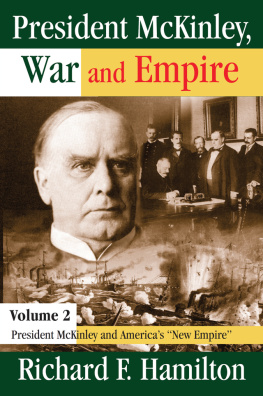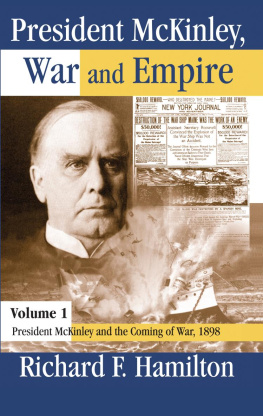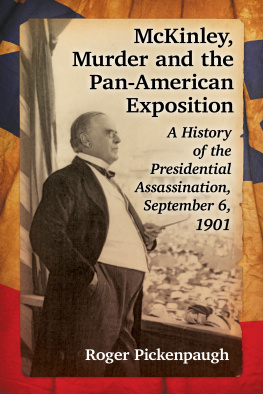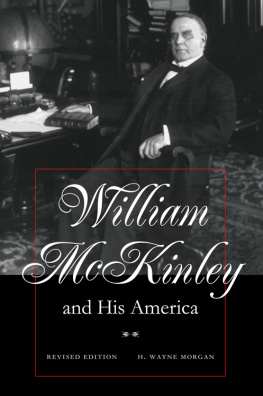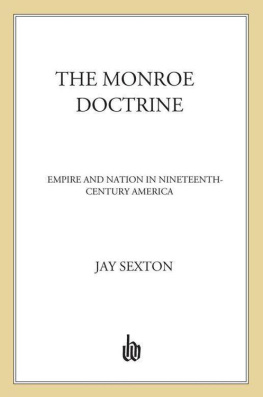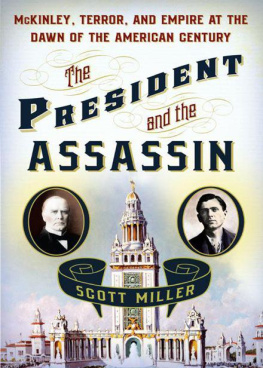President McKinley, War and Empire
President McKinley, War and Empire
Volume 2
President McKinley and America's "New Empire"
Richard F. Hamilton
First published 2007 by Transaction Publishers
Published 2017 by Routledge
2 Park Square, Milton Park, Abingdon, Oxon OX14 4RN
711 Third Avenue, New York, NY 10017, USA
Routledge is an imprint of the Taylor & Francis Group, an informa business
Copyright 2007 by Taylor & Francis.
All rights reserved. No part of this book may be reprinted or reproduced or utilised in any form or by any electronic, mechanical, or other means, now known or hereafter invented, including photocopying and recording, or in any information storage or retrieval system, without permission in writing from the publishers.
Notice:
Product or corporate names may be trademarks or registered trademarks, and are used only for identification and explanation without intent to infringe.
Library of Congress Catalog Number: 2005056879
Library of Congress has cataloged volume 1 as follows:
Hamilton, Richard F.
President McKinley, war and empire/Richard F. Hamilton.
p. cm.(American presidents series)
Includes bibliographical references and index.
Contents: v. 1. President McKinley and the coming of war, 1898.
ISBN 0-7658-0329-1 (cloth: acid-free paper)
1. Spanish-American War, 1898Causes. 2. United StatesPolitics
and government1897-1901. 3. McKinley, William, 1843-1901.
4. United StatesTerritorial expansion. I. Title. II. Series.
E721.H36 2006
973.89dc22 2005056879
ISBN 13: 978-0-7658-0383-2 (hbk)
In the mid-nineties, I was working on a book that was entitled The Major Social Theories . But as it was getting much too large, I divided it into two volumes, the first of which would review Marxism, Marxist revisionism, and Leninisms focus on imperialism. That volume also grew enormously, with the result that I dropped one of the chapters, Imperialism: The United States Experience. I had also written on some American presidents in the post Civil War era, mostly sketches and rough drafts. My thought at the time was to combine these somehow in a book focused on the Spanish-American War and the beginnings of the American Empire. After a digression for a large and complex volume dealing with the origins of World War I, I returned to work on this volume. The first result of this new effort was a long chapter entitled Presidents, Bosses, and Businessmen: 1868-1896. That too had reached impressive size and I had not yet discussed presidents Arthur, Cleveland, and Harrison. It occurred to me that it would be best to drop that chapter.
Several more years of work resulted in a 600-page manuscript (with some 200 pages of notes) entitled President McKinley, War, and Empire . I then realized that a division would be appropriate and useful. The first volume is entitled President McKinley and the Coming of War, 1898 (2006). The second, the work in hand, deals with the outcome, with Americas acquisition of a New Empire.
This work has been supported by the Mershon Center at the Ohio State University. I wish to thank Richard Herrmann, the Centers director, and Mershons superb staff, most especially Beth Russell, for their support and assistance.
Three good friends, William H. Form, David Trask, and Henry A. Turner, deserve special commendation. They have read and commented on all of the chapters, in some instances doing so for several versions. For all three, I wish to award a summa cum laude. My thanks also to various friends and associates who have given generously of their time and wisdomto Edward Bell, Michael Les Benedict, Paul Beck, G. William Domhoff, Hal Durian, Richard Gunther, Peter Hahn, John Higley, Austin Kerr, John H. Kessel, Richard Ned Lebow, Frederick Milford, Carman Miller, Randolph Roth, Paul Schroeder, David Stebenne, and Herbert Weisberg.
Once again, the many contributions of Irene Hamilton are gratefully acknowledged.
Several works have been used with great frequency in the following pages. To simplify their citation, some abbreviations will be used throughout. These are:
Biographical sources:
Dumas Malone, ed., Dictionary of American Biography (New York, 1946 [1934]). Abbreviated as DAB, followed by the volume and page numbers, for example, for John Jacob Astor, we would have DAB, 1:397-399.
John A. Garraty and Mark C. Carnes, eds., American National Biography (New York, 1999). Abbreviated as ANB, the listing for Astor, for example, will be ANB, 1:696-699.
In addition, four leading American history textbooks have been cited at many places. They are:
Robert A. Divine, T. H. Breen, George M. Fredrickson, and R. Hal Williams, America Past and Present , Vol. 2, fifth edition (New York, 1999).
James A. Henretta, David Brody, Susan Ware, and Marilynn S. Johnson, Americas History , Vol. 2, fourth edition (Boston, 2000).
Gary B. Nash, Julie Roy Jeffrey, John R. Howe, Peter J. Frederick, Allen F. Davis, and Allan M. Winkler, The American People , Vol. 2, fifth edition (New York, 2001).
Mary Beth Norton, David M. Katzman, Paul D. Escott, Howard P. Chudacoff, Thomas G. Paterson, and William M. Tuttle, Jr., A People and a Nation , fifth edition (Boston, 1998).
These will be abbreviated throughout as Devine et al., Henretta et al., and so forth.
Discussions of the history and current affairs of any society usually make use of simplification schemes called theories. No one can make sense out of the countless bits and pieces of information involved, often referred to as facts, without some organizing scheme. A general framework, a theory, makes the task of understanding easier. Four theories have dominated analysis and discussion of modern societies in the last centuryliberalism, Marxism, mass society, and pluralism, each with many variants. A fifth theory, elitism, has attracted some advocates but it has typically received much less attention.
This work assesses the utility of these theories in accounting for an unusual event in United States history, the Spanish-American War. My previous volume considered the origins of the war. This volume is concerned with the outcome, the settlement in which the United States gained an empire.
Liberal programs in previous centuries called for limitation of the powers of monarchical-aristocratic regimes or, if censorship allowed, for an end to those regimes. Liberalism, then and now, places heavy emphasis on education, freedom of expression, rational discussion of issues, freedom of association, and free initiatives. Popular selection of leaders at all levels was, and remains, central to the liberal agenda. Gradual extensions of the suffrage produced an ever more-inclusive electorate. The choices of an intelligent and free citizenry, it was argued, would yield the best policies and, accordingly, would contribute to human progress.
Marxism denies these liberal assumptions arguing instead that the control of modern societies rests with a small minority, the bourgeoisie, who own the means of production. The masses, the proletariat, are portrayed as powerless, exploited by the bourgeoisie and subject to the decisions (or whims) of employers. Increasing awareness on the part of the workers, however, would lead to a proletarian revolution that subsequently would bring about the beneficent society.

